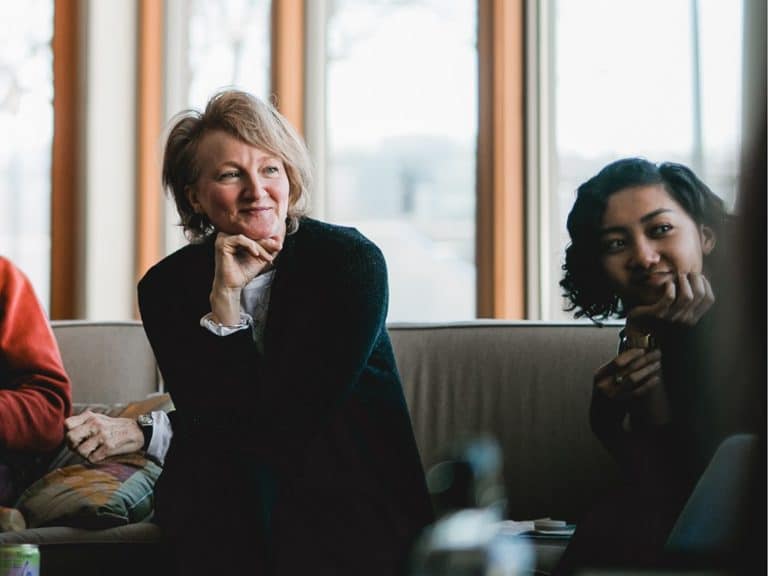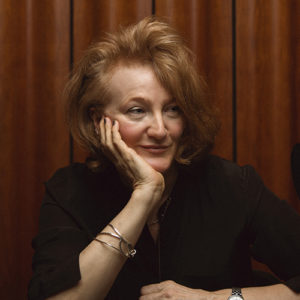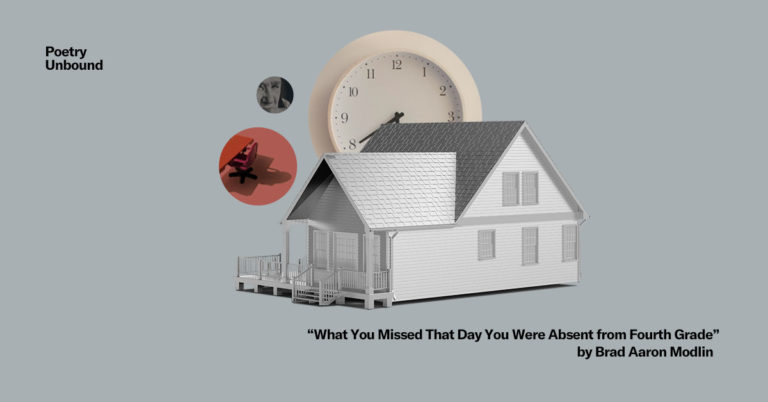Living the Questions
How can we help young people feel like they have a voice in the world?
“I think of this as the wisdom of young adulthood and of the teenage years: You have this sense of urgency about what is possible.”
On nurturing the voice and agency of young citizens — and the importance of fostering intergenerational friendships.
Living the Questions is an occasional On Being segment where Krista muses on questions from our listening community.

Image by Bethany Birnie, © All Rights Reserved.
Guest

Krista Tippett created and leads The On Being Project and hosts the On Being radio show and podcast. She’s a National Humanities Medalist, and The New York Times bestselling author of Becoming Wise: An Inquiry into the Mystery and Art of Living. Read her full bio here.
Transcript
Marie Sambilay: Hello, On Being listeners! This is Marie Sambilay. I’m an audio producer here at On Being Studios. I’m here with another installment of a little experiment we’ve been doing. We’re calling it “Living the Questions,” where Krista responds to questions from you.
Something that I’m always thinking about as a young person in my mid-20s is the question of my own place in the world and my sense of agency and whether my voice is being heard. It’s something that a lot of you have been wondering about, too. One listener, Gillian Huebner, asked it in a really beautiful way: “Where do we allow space for young people to access and articulate their sense of power and purpose, their vulnerability and their courage?”
This led Krista to reflect on how she felt about her own voice and sense of agency as she was growing up.
[music: “Rain” by Dustin O’Halloran]
Krista Tippett: Such an interesting question. I grew up in a small town and what felt like a small world, very contained, known. At this point in my life, I also see that we don’t live in one big world. We live in a collection of small worlds. I think my sense I had of how contained the world was, was probably a sense that a lot of people have in very different circumstances. But I had this feeling that there was a big reality out there. It was just this black hole of the rest of the world. I think I only started to get curious about that when I was a teenager. It was a time before the internet, so just having a sense of the world out there was not accessible in the way it is now. But I also wonder if now you can immediately dial into so many pictures and so much information, and yet, that’s still not the same as knowing or inhabiting other worlds.
I didn’t like being a child. I didn’t like being a teenager. I didn’t feel powerful. I really wanted to be grown up because I felt that grown-ups had voices. Having said that, I was very introspective, and I spent a lot of time thinking, agonizing. I didn’t grow up with many books or ideas. What I did grow up with was the Bible. I was in church three times a week. I spent a lot of time with my Bible and, actually, found it very empowering. It was a great text to just open up to a page and have a deep conversation with myself and with the universe. And I’m sure, often, those conversations I was having with myself and the universe and God contradicted what I was learning in church about the questions or the answers that this book might be presenting me with. But I didn’t actually experience that to be a contradiction. I had this really personal experience of the Bible as being a place to find my voice, that my questions were honored, and that they were OK. I don’t remember agonizing about that. That contradictory reality just felt like the nature of things. So, I guess I did feel I had a voice, and I didn’t.
That question takes me very much to the particularities of my childhood and the place in which I spent my childhood. I suspect that this feeling of having a voice and not having one at the same time — even when people are being really empowered and having a voice — is probably an experience that many people have in those ages. That’s part of that passage of moving between childhood and adulthood. And unfortunately, or fortunately, or just neutrally, because it’s true, I think that that tension of feeling empowered — and always, again and again in life, feeling like you’ve come back to the wilderness — that is also just the nature of breathing and moving through time.
Something I’m aware of, if I think back to myself at those ages, of being a teenager and of being a young adult, is at the same time that, in some ways you know you still have everything to learn and everything to experience, and you can feel so frustrated by what you don’t yet know and haven’t yet done and don’t yet know if you can — you have this sense of urgency. I really think of this as the wisdom of young adulthood and of the teenage years, you have this sense of urgency about what is possible. You have this real curiosity about the big, soaring questions, and what it’s all about, and what your life might all be about. You can see the world whole, and you want to make that real. And I think that that urgency of a person at this stage of life is a real gift to the world.
That’s one of the things that flows into my passion, these days, about eldering and about cross-generational relationship, because that urgency is fierce, but it’s also fragile. And I really think it needs to be accompanied to stay alive, to stay confident in itself. But also, when you are bringing that particular gift to the world, it hurts. That urgency hurts. It’s painful, in kind of an exquisite way, to be able to see the world whole, to long for so much, for so much to be possible. So, to have people in your life who can honor that and accompany it, and not give you a reality check — that’s not what we want from our elders, although we may sometimes want counsel — but actually just embody — I do feel like this is also true of parenting. When your kids are in these aching places of just being human, one of the things that feels natural is to want to be in it with them, to feel their pain. Your child, your teenager is awake all night, you’re awake all night. And it’s not that I am really good at disconnecting, but at some point I understood that what a parent or an elder can offer a younger person is to embody, just physically embody the fact that there is life beyond this moment, that there is calm and groundedness to be found, that one aspires one day to bring together and integrate, also, with the fierceness and passion you have and longings you have and to embody that reality — to temper that really valuable impatience of youth with a lived experience that patience also has its place. Not that the two cancel each other out, but that they can walk together.
I think that I’m probably where I am today because, by no great design, somehow those people came in and out of my life. Later, in my 20s, I more sought them out, but I didn’t know what I was doing. Now I see that it was a really wise thing. I just had this desire. All the way through my 20s, 30s, 40s, and now, I always had at least one female friend who was in her 70s. And that served me so well. I feel like I was fortunate to run into those people or reach for that. That’s something I’m trying to offer to people at this stage in my life, coming at that other side of stages of life — but also would really encourage my younger self, “This is a great thing you’re doing,” and almost to enjoy it more and treat it more seriously than I did.
So consider the possibility that you will meet people, in whatever settings, who will be of a very different generation, and that these also can be your friends — that you don’t just think of people you meet who are your age as your potential friends. Don’t take it on as a project, necessarily, but I think if you are open to that — and actually, one of these older friends, one of the people I’m closest to in the world right now, I got to know her when I moved here 20 years ago. I was in my 30s, and she was probably in her early 60s, and now I’m in my 50s, and she’s in her early 80s. She said to me, way back then — she was from South Carolina, she has this beautiful Southern accent, and she said, “My mother always told me to have friends of different ages.” And she always had. She actually said to me early in our friendship, “I want to be friends with you.” That was a gift to me, for her to just spell that out, because I think we do that with people our own age, but to have that and to say, “This is what we’re doing.” We have this beautiful friendship. And now I’m thinking about what she said to me 20 years ago, as I sometimes say to people 20 years younger than me: “Let’s be friends.”






